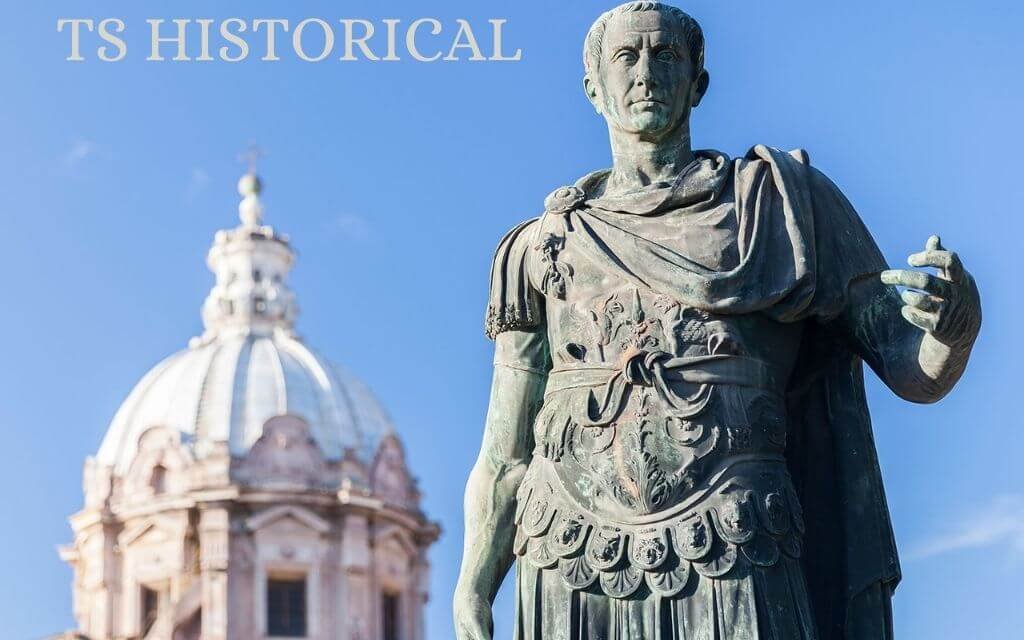
| Born: | 12 July 100 BC Rome, Italy |
| Died: | 15 March 44 BC (aged 55) Rome, Italy |
| Cause of death: | Assassination (stab wounds) |
| Parents: | Gaius Julius Caesar, Aurelia |
| Spouse: | : Cossutia (disputed), Cornelia (m. 84 BC; d. 69 BC), Pompeia (m. 67 BC; div. 61 BC), Calpurnia (m. 59 BC |
| Children: | Julia, Caesarion, Augustus (adoptive) |
| Resting place: | Temple of Caesar, Rome |
| Occupation: | T Temple of Caesar, Rome |
| Notable work: | PoliticiansoldierBellum Gallicum, Bellum Civile |
| Office: | Consul (59, 48, 46–45, 44 BC), Dictator (49–44 BC) |
Table of Content
Julius Caesar Roman ruler
Gaius Julius Caesar Renowned military general, statesman, author, and historian, you probably don’t know much about him, except that he was the dictator of the Roman Republic, and supposedly said, “Et Tu, Brute?” before being stabbed to death.
Julius Caesar’s Early Life
Gaius Julius Caesar was born on July 12th, 100 BCE in Rome. His parents were both highly influential families, his father being a praetor, governing a province near modern-day Istanbul, and his mother’s family producing many census or modern-day presidents. Nobody knows what else Caesar did in his childhood; the two famous biographies of him written by Suetonius and Plutarch (two famous historians) only begin when he was a teenager. Then, when Caesar was about 15, in 85 BCE, his father died, and Caesar became head of his family. Caesar then got married, but Caesar’s uncle, Gaius Marius, was fighting a war, and lost, so he was exiled.
The person who won the war, Sulla, targeted Caesar since he was related to the guy who lost and stripped Caesar of his inheritance. Caesar was forced to go into hiding, but his mother’s family, who were supporters of Sulla, the guy who won, persuaded Sulla to pardon Caesar. Caesar, however, thought that Sulla might still come after him, so he left Rome and joined the Roman Army, winning the Civic Crown (the high award in the Roman Army) for his part in the Siege of Mytilene, which was basically suppressing a rebellion. Then, in 79 BCE, Sulla voluntarily stepped down from the post of dictator and died a year later.
In Rome, he became a lawyer and made a name for himself as a good orator. Then, Caesar was kidnapped by pirates, and the pirates asked for 20 talents of gold as ransom. Caesar said “no, I’m not worth 20 talents, I’m worth fifty! Ask for fifty talents as ransom! Now!”
The pirates did so, the ransom was paid, and then Caesar hunted down the pirates and killed them all. In 73 BCE, he became a pontifex or Roman priest. Then, Caesar was elected a military tribune, the bottom ring on the ladder of Roman politics. In 63 BCE, he ran for Pontifex Maximus (or head priest of the Roman Empire) and won. Next year, in 62 BCE, he became a praetor, and the year after that, he became governor of Hispania Ulterior or southern Spain.
The year after that, in 60 BCE, Caesar ran for the post of consul and won. Here, he joined in an alliance — not official— between himself and two other guys, Pompey and Crassus. The alliance was called the first triumvirate, or rule of three men. Since consulships only lasted a year, Caesar was then assigned a governorship, but he wasn’t content with that. Since he was governor, he had control over four legions or about 20,000 soldiers. Over the next eight years, from 58 to 50 BCE,
Caesar conquered Gaul or modern-day France. In 50 BCE, the Roman Senate ordered Caesar to return to Rome and disband his army. Caesar said no, and prepared for war. The next year, in 49 BCE, Caesar crossed the Rubicon (the boundary where no army was to cross), and famously said, “the die is cast”. For the next four years, Rome was in a civil war, with Caesar coming out on top. The next year, a month before he was assassinated, Caesar proclaimed himself dictator in perpetuity. A lot of people didn’t like this, and a plot to assassinate Caesar was hatched. About a month or two later (exact figures are disputed).
Julius Caesar’s Death

on March 15, 44 BCE, Caesar walked into the Senate. As he was about to take his seat, a crowd of Senators surrounded him. They pulled off his toga and started stabbing him. He was stabbed 23 times. Interestingly enough, there’s no evidence or proof that he did say, “Et tu, Brute?” Most evidence points to him saying nothing while he was being stabbed. After Caesar was assassinated, the Roman Republic collapsed, and, in 27 BCE, Caesar’s adopted son, Octavian, became head of the new Roman Empire. So, that’s the life of Gaius Julius Caesar,
Discover more from TS HISTORICAL
Subscribe to get the latest posts sent to your email.

